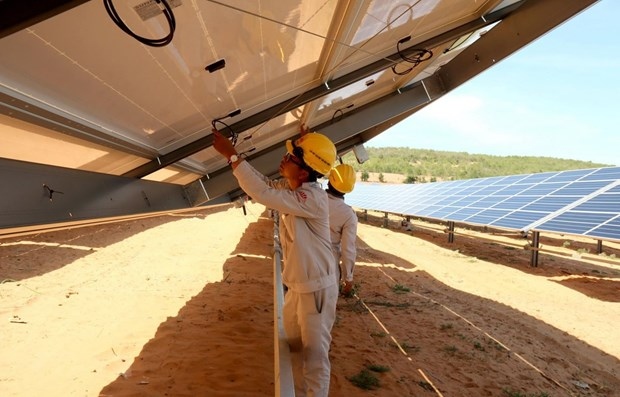UNDP pledges to support Vietnam in green energy transition
The United Nations Development Programme (UNDP) stands ready to support the Vietnamese government in the detailed formulation and implementation of the Just Energy Transition Partnership (JETP) resource mobilisation plan right in 2023, UNDP Resident Representative in Vietnam Ramla Al Khalidi has affirmed.

“This includes our proven technical assistance services to the Governments in green transition/NAMA projects, which can help Vietnam identify cost effective de-risking public instruments to promote and scale up private sector investments in the JETP resource mobilisation plan,” Khalidi said in an interview granted to the Vietnam News Agency (VNA) on the occasion of the Lunar New Year (Tet) holiday.
According to the UNDP Resident Representative, the UNDP is initiating assessments on the impact of phasing-out coal power and energy transition in Vietnam and defining what these processes would specifically mean for the country.
As Vietnam will embark on a greener and more resilient path in the next three-five years, including the JETP, the country needs to accelerate preparations for a package of public instruments to de-risk investments in renewable energies and design a just and feasible process to phase out coals in both state-owned enterprises and foreign-invested coal power plants, she suggested.
She said the Country Programme Document sets out the areas of cooperation between the UNDP and the Vietnamese Government until 2026.
Accordingly, UNDP Vietnam is supporting the Government in the areas of poverty reduction, human development, increasing citizens’ participation and human rights, increasing transparency and accountability, effectively scaling up climate change mitigation and adaptation, disaster risk management, promoting circular economy and the sustainable deployment of clean and renewable energy with a just process, and the sustainable management of natural resources.
Institutionally, the UNDP has contributed to various aspects to strengthen Vietnam’s readiness for climate change governance, institutional capacities, and regulatory frameworks to the UN Framework Convention on Climate Change (UNFCCC) processes.
“This includes our recent contribution to support the key enhancement of Vietnam’s Nationally Determined Contributions (NDC) and the recent National Climate Change Strategy (NCCS) until 2050 to realise the net-zero ambition,” she said.

In the coming years, she noted, the UNDP will focus on support for enhancing transparency framework for NDC implementation in line with Article 15 of the Paris Agreement, and comprehensive policy reform in alignment with net zero 2050 and global goals for adaptation with a just process, including preparedness for climate change legislation and empowerment of youth and women in all climate decision making process.
Financially, the UNDP is initiating work to support Vietnam to introduce needed financial instruments such as carbon tax and carbon market readiness for emission trading system, while designing relevant incentives, including innovative green finance and insurance schemes to leverage domestic and international investments in climate actions.
Currently, the UNDP is working directly with local communities and provinces to strategically channel finance into payments for ecosystem services, nature-based tourism, and private contributions in nature-positive solutions.
In terms of technical assistance, Khalidi said the UNDP is introducing more innovative and integrated solutions to accelerate the implementation of prioritised measures in Vietnam NDC and NCCS.
These include partnering with municipal and provincial authorities to promote the green transportation transition or green agriculture supply chain toward low carbon and resilient systems.
The UNDP deploys extensive work to promote circular economy, such as supporting policy formulation, training businesses and the private sector, developing community-based models to tackle waste management, and sourcing innovative solutions for marine plastic pollution, she said.
Khalidi noted that achieving a just energy transition will require an unprecedented investment effort, which will oblige everyone - government, business, community and household - to realign priorities and indeed to make some personal sacrifices.
